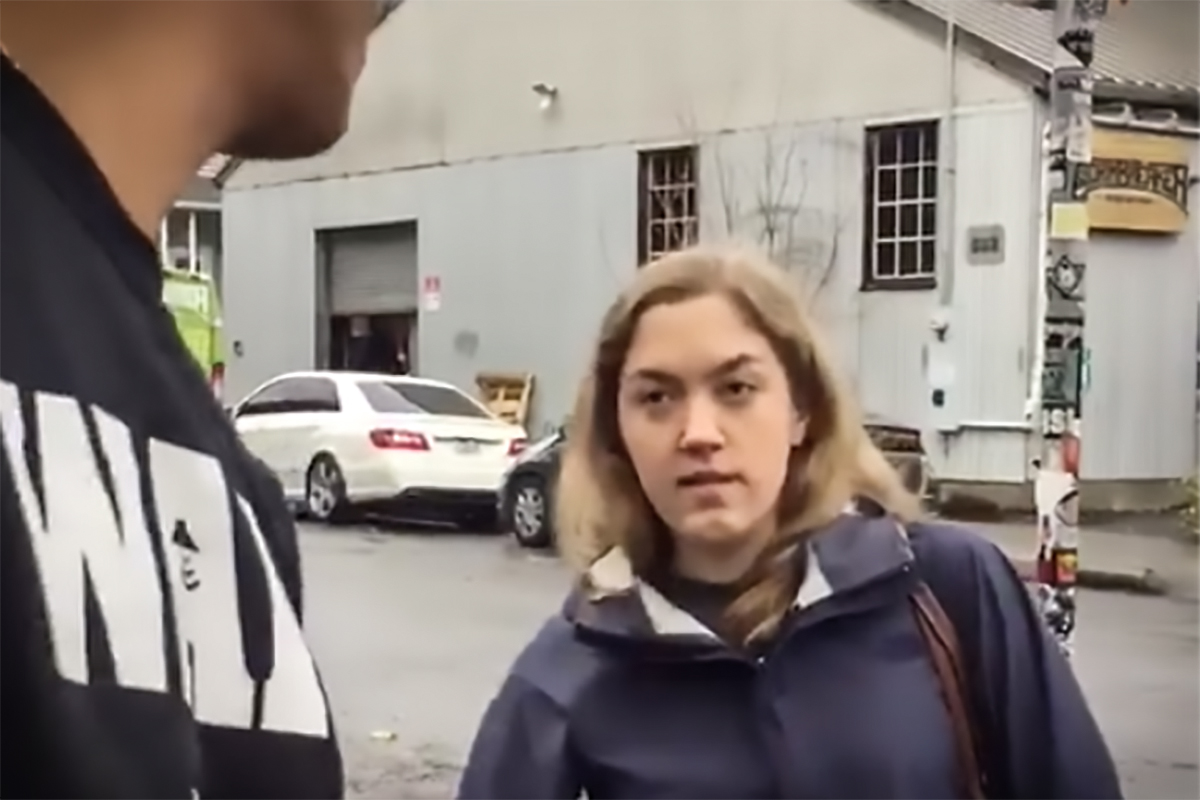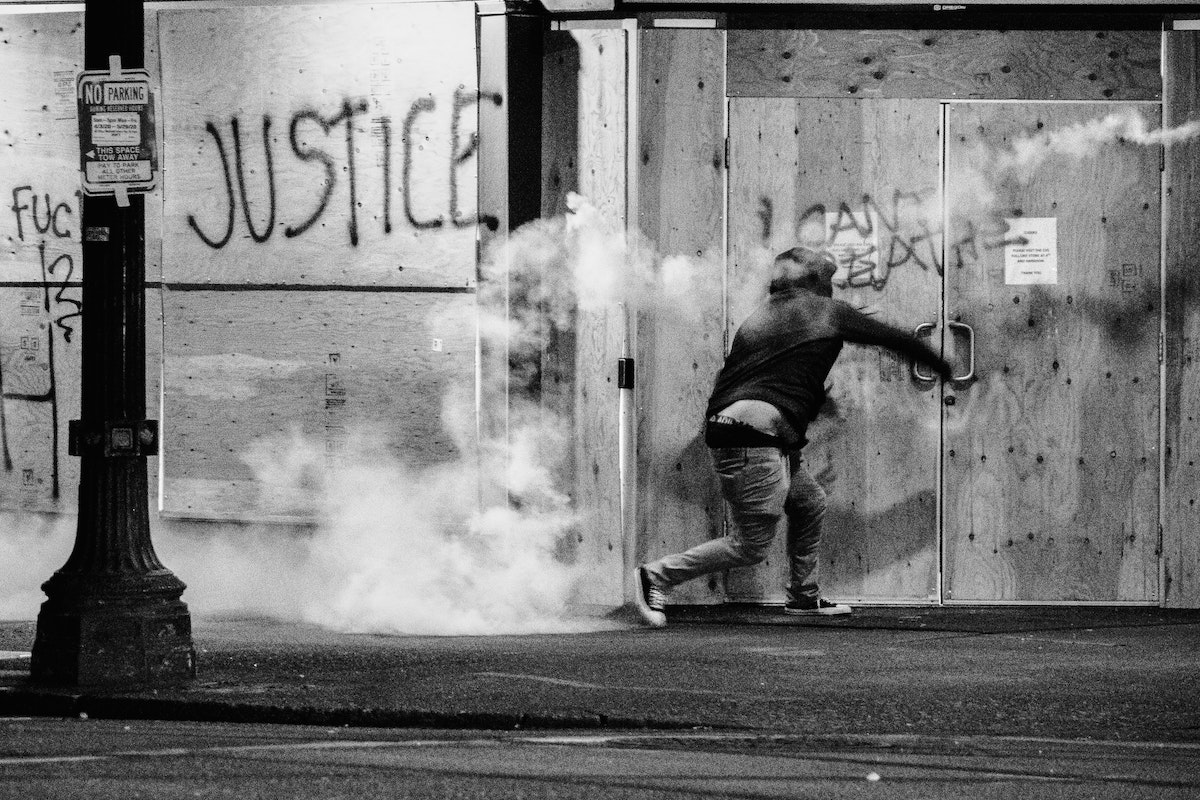Portland
A Racial Shakedown in Portland
The genre of “white people doing something to black people” is, by now, a well-established media genre that generates easy clicks. But there is also an unsettling subplot that few seem willing to discuss.

PORTLAND — In a 30-second video recorded on Oct. 28, a female pedestrian holding a bicycle helmet is seen making a phone call. She’s complaining about a car blocking a crosswalk on a busy street in Portland, Ore. The phone call ends and the car’s occupants—a young black man and woman—walk up to her and take her to task for reporting them. Some angry words are directed at the bicyclist by the man—“go back to your f—ing neighborhood”—and then the video ends.
If this encounter had unfolded in a normal part of the world, this would be where the story ends: Just another squabble in the battle between drivers and non-drivers over public space. But Portland is not normal. This is a city where antifa mobs are allowed to set up roadblocks and mob elderly drivers, all with the mayor’s apparent acquiescence.
The latest, above-described victim is a 28-year-old white woman who was captured on video during a phone call with the Portland Bureau of Transportation’s non-emergency parking hotline. The car belonged to Rashsaan Muhammad, who was with his partner, Mattie Khan. They parked improperly on a North Portland street while ordering food from a nearby burger restaurant. While filming, Ms. Khan accused the bicyclist of being “another white person calling the police on a black person.” She wasn’t. Portland Police have no record of that phone call taking place.
It is hard to know how the pedestrian, derogatorily christened “Crosswalk Cathy” on social media, could have known the race of the car’s owners. Portland doesn’t offer its residents race-tagged parking permits (yet), and the incident occurred on a busy business street. But that didn’t stop Portland Mercury news editor Alex Zielinski from writing a provocative (and wrong)story with the headline, “Woman calls cops on Portland man’s parking job. She’s white. He’s black.”
Portland, meet "Crosswalk Cathy." https://t.co/S2T5bGToXP
— Alex Zielinski (@alex_zee) October 31, 2018
The report, video, and misinformation went viral and spawned a series of other stories targeting the woman. “Portland, Ore., couple Rashsaan Muhammad and Mattie Khan were running to grab a quick bite to eat at Big Burger (sic) when they spotted a woman bearing the skin color of an American terrorist standing across the street looking at their parked car,” read one unsubtle story at The Root. “White lady dubbed ‘Crosswalk Cathy’ called cops because she didn’t like how black couple parked,” headlined another on BET. Newsweek was slightly more charitable, saying she had “allegedly” called the cops. They were all wrong.
Last week’s race controversy ignited by Portland Mercury is not the first time the progressive alternative paper has published race-baiting content. Last year, it ran a libelous (and subsequently retracted) column accusing various restaurants of religious and cultural appropriation—and suggesting they were guilty of “culinary white supremacy.” The predictable result of that column was the siccing of a mob on the female owners of Kook’s Burritos, the business featured most prominently in the piece. They deleted their social media accounts, shut down their food cart, and went into hiding.
“Tribal hatreds are a dangerous thing to stoke,” said Heather Mac Donald, a fellow at the Manhattan Institute and author of The Diversity Delusion. She says most Americans are naïve about the tribal violence that defines much of the historical and modern human experience. “In the worst case, [victim ideologues] are fueling the fires of violent civil strife.”

The genre of “white people doing something to black people” is, by now, a well-established media genre that generates easy clicks. But there is also an unsettling subplot that few seem willing to discuss. The two people of color who star in last week’s viral video both act abominably toward a young woman they’ve just met. In a city where too many bicyclists and pedestrians have been struck and killed in car accidents (2017 was one of the deadliest years with 45 killed), the woman did her role as a good citizen by calling a non-emergency hotline to report the car blocking the crosswalk.
And it was Ms. Khan, not the pedestrian, who instantly racialized the incident, while her male partner called the woman an “idiot” and told her that she doesn’t belong in the neighborhood. Who’s the racist—not to mention segregationist—here?
The couple’s abominable behavior didn’t end after that encounter and the publication of the video on Oct. 29, however. Within hours, Ms. Khan named the bicyclist publicly and posted her photo on social media. Friends and followers of Ms. Khan then continued the doxing, publishing more photos and personal details of the woman. Twitter activist “@Sahluwal,” who only identified himself to me as “Simar,” reposted the video in a tweet watched over 200,000 times. “Twitter, do your thing and identify this woman,” he wrote. Simar told me he was not a witness and did not verify the claim in the video.
Sha Ongelungel, who was recently profiled glowingly as a racial justice activist in The Guardian, published the woman’s employer information on Twitter and encouraged others to call or email them. They obliged and demanded that she be fired. Ms. Ongelungel stopped responding after I inquired if she took any steps to verify the couple’s (false) allegation.
And like the owners of Kook’s Burritos the year before, the victim at the center of the video has deleted her social media presence, taken down her website, and gone into hiding. Her email is no longer listed at her employer’s page. Even some of her family who share the same surname have done the same. This sort of disappearing act now happens regularly in Portland—a new form of excommunication.

While Ms. Khan’s behavior may seem cruel and anti-social, there is a sort of rational logic to it: Progressive Portland is a city where even the most absurd claims of racism are taken seriously and prosecuted hysterically by the media and public.
In May, for instance, a black woman named Lillian Green launched a web campaign against Portland’s Back to Eden Bakery after the vegan shop declined to serve her after closing hours. In the video, she was admirably forthright about her motives for telling the world about this experience: Using the hashtag #LivingWhileBlack, Ms. Green—a doctoral student at Lewis and Clark College—explained that she wants to “blast their ass” on Facebook.
And blasted it was. The owners fired the two women working that evening and offered Ms. Green a job training the remaining employees in “racial inclusivity.” Such incidents send a clear message: Shaming white people, with or without merit, works. People will treat you as a hero. And you will get what you want.
Mattie Khan is now selling clothing merchandise of “Crosswalk Cathy.” She announced the sale on Facebook with a video of Rashsaan Muhammad modeling one of the hoodies at $45 a pop (t-shirts are $25).
In a city whose guilty whites seem ready to roll over on any pretext, no complaint is too absurd to become fodder for race hustling.






